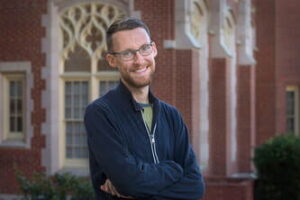by The Cowl Editor on October 21, 2021
Campus

On Friday, Oct. 15, a sunny fall afternoon on PC’s campus, students and faculty gathered in Ruane 105 to attend a lecture given by Dr. John Schwenkler titled “Doing the Truth: G.E.M. Anscombe and the Atomic Bomb.” Schwenkler is an associate professor of philosophy at Florida State University and specializes in philosophy of actions and ethics.
Schwenkler’s talk was about Elizabeth Anscombe and her time as a research fellow at Somerville College, located in Oxford, England, during the postwar era of the 1940s, ’50s, and ’60s.
Schwenkler opened his lecture with a quote from a warning to the dons of St. John’s College, Oxford: “The women are up to something in Convocation…we have to go and vote them down.” The women in question were, of course, led by Elizabeth Anscombe.
In 1956, she had embroiled herself in massive controversy as she voted against Oxford’s intention to award Harry S. Truman with an honorary degree for his leadership during and after WWII. One of the few women in her field, as well as a mother to seven children, she received little support and open contempt from her academic community.
Anscombe knew her protest would not stop the establishment of Oxford College from bestowing an honorary degree upon Truman, the man who “ended” WWII. Her aim was that “he (Truman) would not receive this award without opposition expressed.” Why did she oppose the honor? She believed Truman was responsible for the mass murder of the Japanese in Hiroshima and Nagasaki.
Schwenkler brings Anscombe’s life to PC because she was one of the great Catholic moral guides of the 20th century, developing “action theory” in her 1957 book, Intention. Action theory can be described succinctly through the example of Anscombe herself. As she is sitting in her office using a pen on a piece of paper, an observer would conclude that she is writing. Her intentions can be discerned through the observation of her actions.
Through her application of “action theory” to Truman, Anscombe held that the murder of Japanese citizens was not the byproduct of an attempt to end the war, but the heart of Truman’s intention in dropping the atomic bomb. His intention was not to end the war directly, but rather to end the lives of innocent people with the ultimate agenda of ending the war. For Anscombe, Truman’s actions and the suffering, pain, and destruction of the Japanese fall squarely into the definition of murder.
Anscombe also fought against the extremely popular notion of the time that Truman chose the option with the best outcome. Pulling from Thomas Aquinas and other Catholic doctrines, she says that in the Christian faith certain things cannot be done, no matter the consequences, and one of these things is murder.
According to Anscombe and Schwenkler, we must calculate what is best only in the context of obedience to God’s commandments. To step outside of the commandments is to step outside of trust in God’s plan for the universe and its inhabitants, or divine providence.
The lecture was followed by a highly insightful question-and-answer session. Students took the opportunity to delve deeper into the life of Anscombe and argue about the different schools of philosophy that could be applied.
Following Schwenkler’s presentation, attendees moved into the Great Room in Ruane for refreshments where students and faculty continued their lively conversation.
The Humanities Forums are a time to come together at the end of the week to reflect upon and consider the big questions of humanity.
Those who were unable to attend the lecture can access Schwenkler’s short essay “Untempted by Consequence: G.E.M. Anscombe’s Life of ‘Doing the Truth’” on the Commonweal Magazine website.